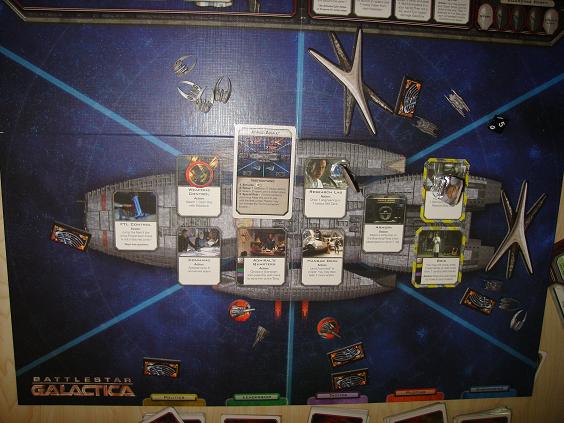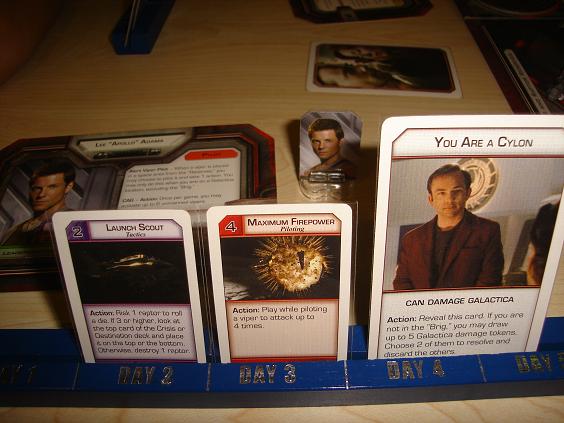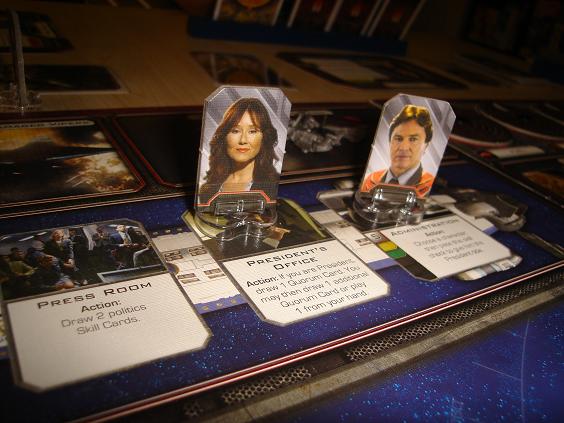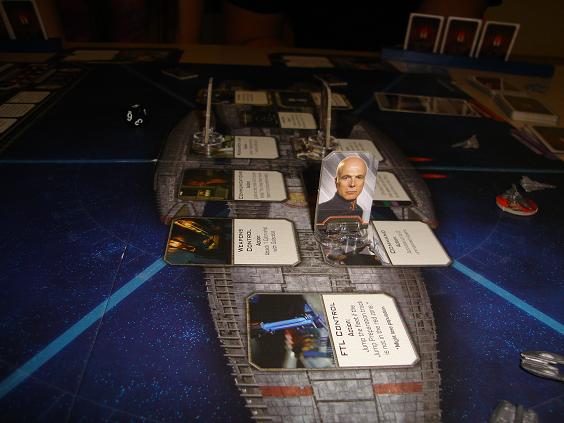
Like so many television shows, Battlestar Galactica was, for us, a great watch for the first couple of seasons or so, but then crashed and burned spectacularly. Note to writers: when you claim to have a plan, you better make sure you do have one instead of making shit up as you go along. Even so, the characters grabbed us enough that it was one of first boardgames we were especially interested in trying. In all, we’ve played it three times now, and while my wife has cooled a bit on it, I still think it’s a wickedly fun game.
Battlestar Galactica is a cooperative game with a traitor element. The players take on the roles of the characters from the show and work together to resolve the various crises faced by the human fleet as they try to escape from the Cylons. The humans win once the fleet manages to jump a certain distance away. At least one player in every game however is secretly a Cylon and wins only if the humans lose. This means that the humans will be trying to find out who the Cylons are to neutralize them and this is where most of the tension in the game lies.
One of the praises that’s frequently heard about this game is how faithful it is to the show and that’s absolutely true. Each of the ten selectable characters have different strengths and weaknesses that fans will instantly recognize from the series. Gaius Baltar for example can use his Cylon Detector ability to look at a player’s Loyalty Card which determines whether a player is human or Cylon. Unfortunately, he also draws extra Loyalty Cards, which means he has a higher chance of being a Cylon and the other players know it.
Each character also draws a different mix of Skill Cards every turn. These cards have a two-fold use. One, they can be played for their effects as described on the cards’ text. These include things like using up your action to give another player two actions, or adding bonuses to die rolls. As you might expect, the effects roughly correspond to the type of Skill Card. This means you need to be able to draw Engineering cards to get the Repair card that fixes damaged Vipers and Galactica locations while drawing Piloting cards lets you get the Maximum Firepower card that gives you four attacks while piloting a Viper.

Or two, they can be played for their value in a Skill Check. Skill Checks are one of the types of crises befalling the Galactica and its fleet. At the end of every player’s turn, a card is drawn from the Crisis deck. Cards that call for a Skill Check will have a difficulty listed on it as well as colours denoting which type of Skill Cards contribute to beating that crisis. Two Skill Cards are initially added from the random Destiny Deck face down to give the check a measure of uncertainty and each player takes turns to add cards face down.
Once that’s done, the cards are shuffled so that no one can tell who added which cards and then uncovered. Skill Cards of the correct colour contribute to resolving the crisis while cards of the wrong colour count as negative points, giving the Cylons a way to sabotage these checks. The check is passed if the total positive value exceeds the difficulty on the Crisis card. Theoretically, the random cards from the Destiny deck helps to provide some cover to the Cylons so that they can do this without revealing themselves, but in practice, I’ve found that it’s quite difficult to do this without tipping your hand as everyone draws a different mix of Skill cards.
So what happens when the humans fail a crisis? At the top of the game board is a series of dials that represent the combined resources of the human fleet: Fuel, Food, Morale and Population. Failed crises usually cause a loss of one or more types of resources. Whenever at least one resource drops to zero, the humans lose the game. In addition, the humans also lose if Galactica takes too much damage or if Cylon Centurions successfully board the Battlestar. This means that the humans have multiple losing conditions but only one winning condition: jump a distance of eight plus one final jump after that.
No game based on the series would be complete without space combat of course and being a Fantasy Flight production, this one comes with nice plastic components for the various Raiders and Vipers needed. The rules for space combat are quite streamlined but often feels almost inconsequential. Certain types of Crisis Cards cause various Cylon ships to appear around Galactica, together with civilian ships that when destroyed, cause the fleet to lose resources. But the rules state that whenever Galactica jumps everything in space is simply cleared off the board so it’s not uncommon to spend time placing lots of tokens and other bits in space only to have them cleared away without effect in short order.

There’s quite a bit more in the way of rules actually. For example there is always an Admiral, who gets to choose destinations to jump to, and a President, who controls a hand of Quorum Cards with powerful effects. But for the most part, everything is quite intuitive and easy to grasp, quite an impressive feat given how much “stuff” the game has. The most inconvenient part is probably having to roll a die in space combat and checking a chart to see if it’s a hit.
When we first started playing Battlestar Galactica, the game had a reputation at CarcaSean as being unfairly balanced towards a Cylon victory, so much so that many players actively hoped to be Cylons. I think this was because many of the players weren’t properly playing the Skill Cards for their effects and only using them for their values in Skill Checks. I note that all of the Cylon victories I’ve seen were due to a resource were depleted. I’ve never seen the Galactica get blown up or the Centurions successfully board the ship.
In our most recent game, both my wife and I both ended up as Cylons and I learned a lesson on how difficult it is for the Cylons to actually cause any damage while still remaining hidden. Once the humans start trusting each other enough to liberally use cards like Executive Order and make an effort to draw enough Politics cards to ensure that an Investigative Committee card is played for every Skill Check, being a Cylon is a frustrating experience indeed.
This was also our first experience of the Sympathizer mechanic whereby the player who gets this Loyalty Card joins the Cylon team if the humans are winning and vice versa if the humans are losing. It felt gamey because this meant that a Cylon I wanted to help ensure that no resource fell into the red so that the Sympathizer would be on my team while the humans cheered when a resource was depleted enough to ensure that the Sympathizer would help them.

Another potential problem is the importance of strictly abiding to the secrecy rules. For example, while the “You Are Not a Cylon” Loyalty Cards have only flavour text, the “You Are A Cylon” cards details a special ability that you can use when you reveal yourself as being a Cylon, provided you haven’t been thrown into the brig. This means that the Cylon player needs more time to read his or her Loyalty Card while the human players merely need to glance at theirs. To avoid throwing suspicion on the Cylons, Sean asks everyone to spend an extra ten seconds to look at their cards, but that’s just one of the many ways that the inherent limitations of the physical components make it hard to hide being a Cylon.
That said, assuming that you have players who are willing to go along with the secrecy rules, I think that Battlestar Galactica is a great game with plenty of tension. It’s especially fantastic in making players feel stressful! Certainly some of its rules feel a bit clunky and you don’t want to go in thinking that this is a game about space combat, but there’s no faulting how faithfully the game’s mechanics not only sticks to its source material but even brings it to life on a boardgame table. I, for one, am particularly eager to get to play it with the Pegasus expansion
Do take note that this is probably not a game that you would want to play over and over again with the same pool of players as you’d eventually tell who’s a Cylon and who’s not from their reactions. Contrary to most other boardgames, being the best player in this game doesn’t mean being the smartest or fastest at thinking, but being the best actor and liar.
2 Responses to “Battlestar Galactica (Boardgame)”
Trackbacks
Leave a Reply